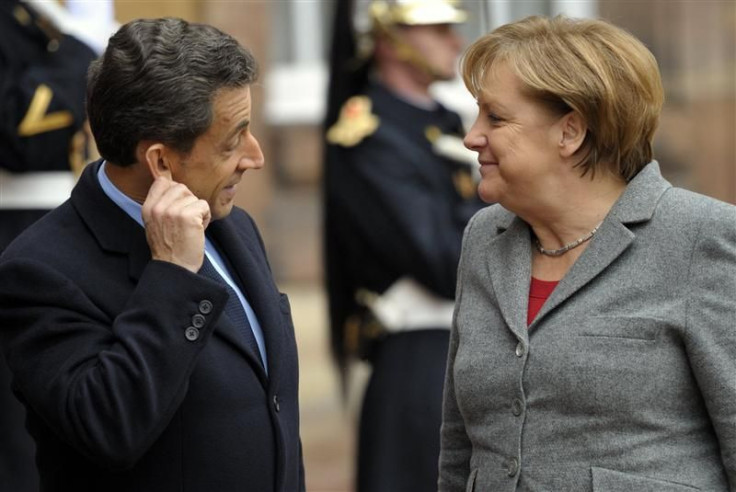Germany, France Plan Quick, New Stability Pact: Report

German Chancellor Angela Merkel and French President Nicolas Sarkozy are planning more drastic means -- including a quick new Stability Pact -- to fight the Eurozone sovereign-debt crisis, Welt am Sonntag reported Sunday.
The Sunday newspaper reported in an advance before publication that if necessary Germany and France were ready to join a number of countries in agreeing to tough budget discipline.
The account, echoing a Reuters report on Friday from Brussels, quoted German government sources as saying that the crisis-fighting plan could possibly be announced by Merkel and Sarkozy in the coming week.
The report said that because it would take too long to change existing European Union treaties, Eurozone countries should avoid such delays by agreeing to a new Stability Pact among themselves -- possibly to be implemented at the beginning of the new year.
It could be similar to the Schengen Agreement that allows for uninhibited cross-border travel for citizens in countries that take part. Among the countries in the Stability Pact, there would be a treaty spelling out strict deficit rules and control rights for national budgets.
The European Central Bank should also emerge more as a crisis fighter in the Eurozone. The ECB is independent, and governments cannot tell it what to do. But the expectations on the ECB are clear, Welt am Sonntag wrote.
Based upon these measures, there should be a majority within the ECB for a stronger intervention in capital markets, Welt am Sonntag said. It quotes a central banker as saying, If the politicians can agree to a comprehensive step, the ECB will jump in and help.
In Brussels on Friday, Eurozone officials said a push by Eurozone countries toward very close fiscal integration could give the ECB the necessary room to scale up Eurozone bond purchases and stabilize markets.
Although the ECB cannot directly finance governments, it has been buying Italian and Spanish bonds on the secondary market since August to try to keep down borrowing costs for the Eurozone's third- and fourth-largest economies and thus contain the spreading of Europe's sovereign-debt problem.
Tight fiscal integration is being considered by France and Germany, the officials said, with Berlin pushing to change the European Union treaty so that a country could be sued for breach of EU budget rules in the European Court of Justice.
The European Commission, the EU executive arm, put forward proposals on Wednesday to grant it intrusive powers of approval of Eurozone budgets before they are submitted to national parliaments, which, if approved, would effectively mean ceding some national sovereignty over budgets.
This could lead to joint debt issuance for the Eurozone, where countries would be liable for each others' debts.
Germany strongly opposes the joint issuance idea fearing spendthrift countries would piggyback on its low borrowing costs -- meaning no gain for the saints and no pain for the sinners.
(Additional reporting by Jan Strupczewski in Brussels; writing by Erik Kirschbaum; editing by Elizabeth Piper)
© Copyright Thomson Reuters 2024. All rights reserved.





















